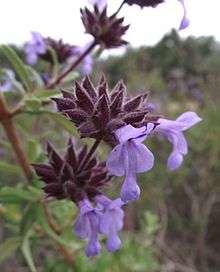Salvia brandegeei
| Salvia brandegeei | |
|---|---|
 | |
| Scientific classification | |
| Kingdom: | Plantae |
| (unranked): | Angiosperms |
| (unranked): | Eudicots |
| (unranked): | Asterids |
| Order: | Lamiales |
| Family: | Lamiaceae |
| Genus: | Salvia |
| Species: | S. brandegeei |
| Binomial name | |
| Salvia brandegeei Munz | |
Salvia brandegeei, the Santa Rosa Island sage[1] or Brandegee's sage, is a perennial evergreen shrub that grows to 3-4 feet in its native habitat. For many years, it was thought to be native only to Santa Rosa Island, one of the Channel Islands of California. In the 1960s and 1970s six colonies were found in Baja California. In cultivation, the plant will reach 4-5 feet tall and up to 7 feet (2.1 m) wide. It has dark green scalloped leaves, about 3-4 inches long and 0.5 inch wide. The pale lavender flowers are about 0.5 inch long, in tightly spaced whorls. The violet-gray calyx, combined with the wide open flower lips, make it a very showy flower.[2]
References
- ↑ "Salvia brandegeei". Natural Resources Conservation Service PLANTS Database. USDA. Retrieved 28 October 2015.
- ↑ Clebsch, Betsy; Barner, Carol D. (2003). The New Book of Salvias. Timber Press. p. 48. ISBN 978-0-88192-560-9.
External links
This article is issued from
Wikipedia.
The text is licensed under Creative Commons - Attribution - Sharealike.
Additional terms may apply for the media files.